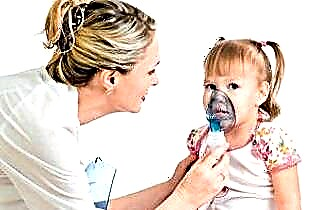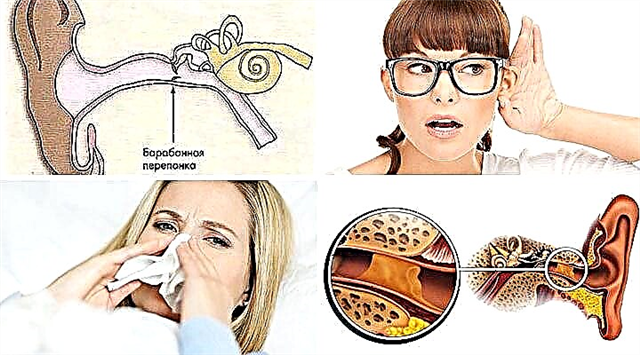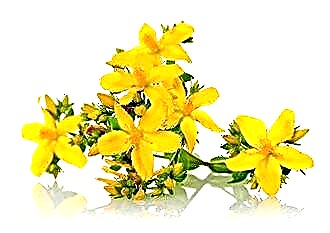A small child's cough is a common occurrence, which should not be scared and give the baby cough tablets at the first sneeze. Often children's cough is of a non-infectious nature and then, in order to get rid of it, it is enough to use alternative methods of treatment. They also help well against colds, acute respiratory infections and acute respiratory viral infections, if the diseases are not started. But if the temperature rises or there are other alarming symptoms, only a pediatrician should decide how to treat a cough in a 2-year-old child.
Cough reasons
 Before taking cough pills or other medicines, you must discard all non-infectious reasons for which it may appear. One of them may be a banal allergy to food, house dust, flowering plants.
Before taking cough pills or other medicines, you must discard all non-infectious reasons for which it may appear. One of them may be a banal allergy to food, house dust, flowering plants.
In the morning, babies under 2 years old usually cough to free the airways from the mucus that has accumulated there during the night. Careful rinsing of the nose, which is advisable to be done every day, using saline or boiled water, can help them in this.
A cough also appears if the air in the child's room is too dry, which often happens in the autumn-winter period, when the heaters are turned on. The temperature, purity and humidity of the air in the room where the child is located must be constantly monitored. And at the same time periodically inspect it for possible irritants or allergens: household chemicals, plants with a strong odor, animal hair, perfumes, etc.
The smallest have a cough when their teeth begin to actively erupt. This period is accompanied by abundant saliva, which the child does not have time to swallow. And given the fact that the process can continue for quite a long time, sometimes up to 1.5-2 years of age, the baby can “cough up” a little bit all the time.
It is worse when the cough is associated with chronic diseases of the respiratory tract or other internal organs. It often occurs against the background of rhinitis and sinusitis due to the constant flow of thick mucus into the throat, irritating the larynx.
Cough provokes reflux disease, cardiovascular failure, neoplasms and even the presence of parasites. Any cough remedies in these cases are completely useless or give only a short-term effect. Until the main cause of the cough reflex is identified and eliminated, it is impossible to get rid of the problem. The only way out in this case is to undergo a comprehensive diagnostic examination and, based on its results, choose a way to cure a cough.
Alarming symptoms
 Infectious diseases that cause coughing can be very dangerous, especially for a child under 2 years old. Due to the fact that babies have a short Eustachian tube, otitis media rapidly develop against the background of respiratory diseases, which are the most common cause of cough. Severe swelling of the mucous membranes can lead to the fact that the baby begins to experience oxygen deprivation and simply suffocate. And to cope with such a condition at home without the use of antibiotics or other potent drugs is unrealistic. And delay can lead to serious complications and even death.
Infectious diseases that cause coughing can be very dangerous, especially for a child under 2 years old. Due to the fact that babies have a short Eustachian tube, otitis media rapidly develop against the background of respiratory diseases, which are the most common cause of cough. Severe swelling of the mucous membranes can lead to the fact that the baby begins to experience oxygen deprivation and simply suffocate. And to cope with such a condition at home without the use of antibiotics or other potent drugs is unrealistic. And delay can lead to serious complications and even death.
Immediate consultation with a therapist, and possibly hospitalization of the baby, is required when a child of 2 years or younger has the following symptoms:
- body temperature increased to 38.5OC and more;
- there are signs of severe intoxication: nausea, vomiting, chills;
- the child completely refuses to eat and drink;
- the tonsils are greatly enlarged and covered with a white or purulent coating;
- there is severe swelling of the throat and tongue;
- coughs up yellow-green mucus with a purulent odor;
- there are traces or blood clots in the sputum;
- strong wheezing is heard when inhaling;
- paroxysmal cough accompanied by suffocation;
- shortness of breath, blueness of the lips, pallor of the skin;
- a small red rash appeared on the baby's skin.
Most likely, the child has one of the most dangerous diseases: infectious pneumonia, purulent bronchitis, scarlet fever, diphtheria, whooping cough, etc. In this case, urgent complex treatment with antibiotics is necessary, which should only be selected by a doctor.
Home treatment
But if the situation is satisfactory and there is no reason for severe anxiety, then you can start home treatment with proven folk remedies. And the first thing to do is to put the child to bed and provide him with maximum peace and comfort. Toddlers are very mobile and often cannot be done easily, but the use of force or shouting in this case is useless. Create a crib activity for your child. He will quickly get tired and calm down on his own.
At temperatures up to 37.2-37.5OThe following methods of cough treatment will be effective:
 Drink plenty of fluids. It is necessary to avoid dehydration, moisturize the mucous membranes, warm the throat, flush mucus from the larynx and accelerate the elimination of toxins from the body. It is better to drink a weak decoction of chamomile, lime blossom, rose hips, raspberries. It is undesirable to add lemon - many children are allergic to citrus oils, and the acid can pinch the throat, irritating it even more. For a child's cough, dried fruit compote, cranberry juice or liquid berry jelly (strained or wiped) are also suitable for a child. Drinking temperature - from 40 to 50OC. It is desirable that the baby drinks up to 1-1.5 liters of liquid per day.
Drink plenty of fluids. It is necessary to avoid dehydration, moisturize the mucous membranes, warm the throat, flush mucus from the larynx and accelerate the elimination of toxins from the body. It is better to drink a weak decoction of chamomile, lime blossom, rose hips, raspberries. It is undesirable to add lemon - many children are allergic to citrus oils, and the acid can pinch the throat, irritating it even more. For a child's cough, dried fruit compote, cranberry juice or liquid berry jelly (strained or wiped) are also suitable for a child. Drinking temperature - from 40 to 50OC. It is desirable that the baby drinks up to 1-1.5 liters of liquid per day.- Warm milk. Good for coughs, but not a substitute for drinking. Milk does not wash mucus from the throat, but forms a greasy film on it, which relieves severe irritation. It is better to give it at night - it will speed up falling asleep and allow you to spend most of the night calmly. You can add goat fat, soda, "Borjomi", honey, cocoa butter to milk. You need to drink it in small sips, lying in bed and after that no longer talk.
- Gargling. A necessary element of treatment, thanks to which the oral cavity is cleared of infection. For the procedure, use a solution of sea salt, antiseptics (diluted furacillin, potassium permanganate, chlorophyllipt), decoctions of herbs with anti-inflammatory and / or antibacterial properties: eucalyptus, oak bark, calendula, St. John's wort, elecampane. In this case, care must be taken that the baby does not swallow rinsing solutions. Therefore, if he himself still cannot do this, then he must rinse his neck out of the syringe, tilting his head down over the basin. Gargle in the morning and after meals, before treating the throat with local preparations.
- Mustard plasters. A good cough suppressant, but they must be used carefully - the skin of a small child is easily irritated and a severe burn can occur. Therefore, before the procedure, it is smeared with a thin layer of petroleum jelly or fatty baby cream, which will somewhat weaken the effect. Mustard plasters are placed on the chest or back, avoiding the heart area, insulated with a terry towel and checked every 2 minutes the condition of the skin. It should be bright pink, but not red. Keep the mustard plasters for no longer than 5-6 minutes, do the procedure every other day.
- Trituration. An equally effective, but safer remedy to relieve coughs in the smallest. For grinding use special balms: "Star", "Doctor Theiss" and others, or alcohol tinctures of propolis, eucalyptus, calendula, diluted in half with water. It is important to do it correctly - the product is first evenly distributed over the skin, and then the baby's breast is massaged with light circular movements, without pressure. Perform at night, insulate the breast with a woolen scarf or terry towel.
 Honey. If the child is not allergic to bee products, honey will become an indispensable aid in the fight against coughs.It can be added to warm herbal tea or milk, sucked under the tongue instead of a cough tablet, and used for compresses, rubbing, and honey cakes. Honey has powerful antibacterial, anti-inflammatory and antiseptic properties. But you shouldn't get carried away with this product. The maximum daily dose for a child under 2 years old is 20 grams. This is just one tablespoon, which must be divided into several receptions.
Honey. If the child is not allergic to bee products, honey will become an indispensable aid in the fight against coughs.It can be added to warm herbal tea or milk, sucked under the tongue instead of a cough tablet, and used for compresses, rubbing, and honey cakes. Honey has powerful antibacterial, anti-inflammatory and antiseptic properties. But you shouldn't get carried away with this product. The maximum daily dose for a child under 2 years old is 20 grams. This is just one tablespoon, which must be divided into several receptions.- Fresh juices. Freshly squeezed juices of carrots, beets, cabbage, potatoes have excellent anti-inflammatory properties, but diluted in half with water. It is great for gargling, rinsing, or instilling a spout. Juice of ginger, black radish, onion or garlic mixed with honey is an excellent syrup that makes it easier to cough up and relieves inflammation of the mucous membranes. Raspberry and cranberry juice mixed with sugar syrup, for children from 2 years old, may well replace pharmaceutical cough remedies.
- Inhalation. Steam inhalation is effective for almost all diseases of the upper respiratory tract. They expand the bronchi, facilitate breathing, relieve coughing attacks, and convert an unproductive cough into a productive one. For inhalation, coniferous essential oils, herbal decoctions, soda solution or ready-made pharmaceutical preparations are suitable. The duration of the procedure is up to 7-10 minutes, it can be performed up to 2 times a day.
During home treatment, it is important to closely monitor the general condition of the baby. If it has not noticeably improved in a few days, or if two or more of the above symptoms appear, see a doctor immediately!
Pharmacy preparations
Once again, we emphasize that the doctor should choose the cough medicine for children. Even ordinary plant-based syrup can only worsen the situation if the mechanism of action of the drug is not taken into account, which you may not have the slightest idea.
There are three types of cough syrup for children: antitussive, expectorant and mucolytic. Each of them is prescribed for a certain type of cough, taking into account the characteristics of the course of the disease.
 Good results are given by cough lozenges for resorption. The most harmless of these means is the usual "Mukaltin", which is a well-crushed medicinal herb. But there are also antibiotic cough pills that are effective for tonsillitis, pharyngitis, laryngitis and other sore throats: Faringosept, Septefril, Septolette, etc. take such responsibility, then, at least, read the instructions well and in no case exceed the dosages indicated in it.
Good results are given by cough lozenges for resorption. The most harmless of these means is the usual "Mukaltin", which is a well-crushed medicinal herb. But there are also antibiotic cough pills that are effective for tonsillitis, pharyngitis, laryngitis and other sore throats: Faringosept, Septefril, Septolette, etc. take such responsibility, then, at least, read the instructions well and in no case exceed the dosages indicated in it.
Depending on the condition of the baby, if necessary, antipyretic, anti-inflammatory, antifungal, antihistamines and other drugs can also be prescribed.
If the test results confirm the bacterial nature of the disease, antibiotics have to be used, which only a doctor should select. Usually these are penicillins or new generation cephalosporins, which have minimal side effects.
It is very important to follow through with the treatment, whether it is home or traditional. Even a residual cough cannot last more than 2-3 weeks. Therefore, if the child has been ill for a month now, but continues to cough, go to the hospital again. Chronic cough is very difficult to cure, so do everything to prevent it from occurring.

 Drink plenty of fluids. It is necessary to avoid dehydration, moisturize the mucous membranes, warm the throat, flush mucus from the larynx and accelerate the elimination of toxins from the body. It is better to drink a weak decoction of chamomile, lime blossom, rose hips, raspberries. It is undesirable to add lemon - many children are allergic to citrus oils, and the acid can pinch the throat, irritating it even more. For a child's cough, dried fruit compote, cranberry juice or liquid berry jelly (strained or wiped) are also suitable for a child. Drinking temperature - from 40 to 50OC. It is desirable that the baby drinks up to 1-1.5 liters of liquid per day.
Drink plenty of fluids. It is necessary to avoid dehydration, moisturize the mucous membranes, warm the throat, flush mucus from the larynx and accelerate the elimination of toxins from the body. It is better to drink a weak decoction of chamomile, lime blossom, rose hips, raspberries. It is undesirable to add lemon - many children are allergic to citrus oils, and the acid can pinch the throat, irritating it even more. For a child's cough, dried fruit compote, cranberry juice or liquid berry jelly (strained or wiped) are also suitable for a child. Drinking temperature - from 40 to 50OC. It is desirable that the baby drinks up to 1-1.5 liters of liquid per day. Honey. If the child is not allergic to bee products, honey will become an indispensable aid in the fight against coughs.It can be added to warm herbal tea or milk, sucked under the tongue instead of a cough tablet, and used for compresses, rubbing, and honey cakes. Honey has powerful antibacterial, anti-inflammatory and antiseptic properties. But you shouldn't get carried away with this product. The maximum daily dose for a child under 2 years old is 20 grams. This is just one tablespoon, which must be divided into several receptions.
Honey. If the child is not allergic to bee products, honey will become an indispensable aid in the fight against coughs.It can be added to warm herbal tea or milk, sucked under the tongue instead of a cough tablet, and used for compresses, rubbing, and honey cakes. Honey has powerful antibacterial, anti-inflammatory and antiseptic properties. But you shouldn't get carried away with this product. The maximum daily dose for a child under 2 years old is 20 grams. This is just one tablespoon, which must be divided into several receptions.

